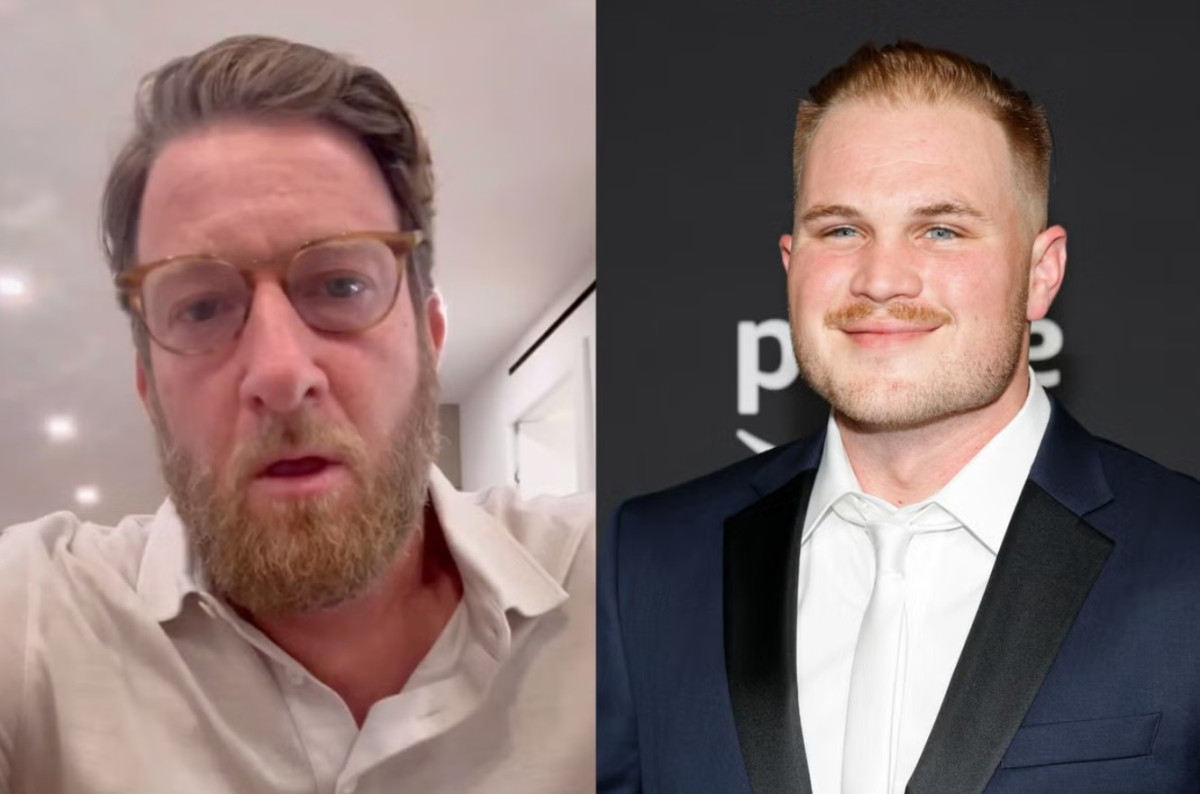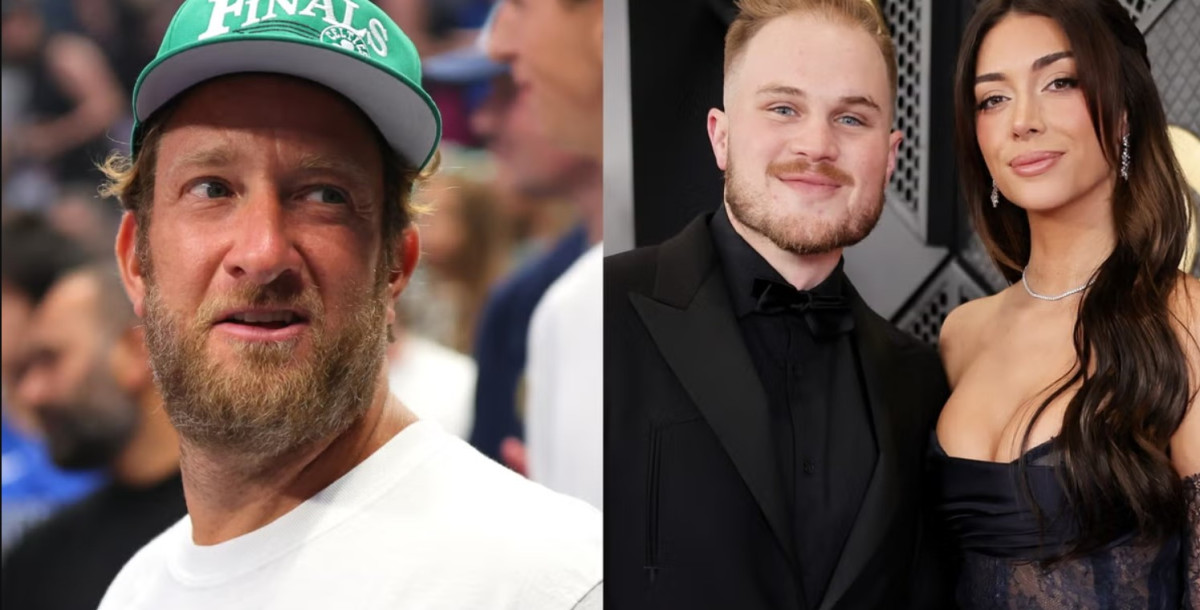Zach Bryan Diss Track Video Sparks Online Firestorm
Dave Portnoy, the founder of Barstool Sports, is no stranger to controversy, but his recent foray into the music industry has sparked a new level of discourse. Known for his bold personality and media prowess, Portnoy has expanded his repertoire to include music production, teaming up with podcast co-host Josh Richards to release a diss track titled “Smallest Man.” The song, which targets country singer Zach Bryan, delves into personal territory, referencing Bryan’s recent split from another of Portnoy’s co-hosts, Brianna Chickenfry.

The track’s release on November 5 quickly stirred up attention, not just for its sharp lyrics but also for the legal and contractual entanglements it soon encountered. Within a short span, “Smallest Man” was taken down from major streaming platforms like YouTube and Spotify, raising questions about the reasons behind its removal. The song’s disappearance from these platforms points to issues possibly related to copyright claims or other legal constraints, highlighting the complexities of music rights in the digital age.
This incident has not only highlighted Portnoy’s controversial entry into music but has also underscored the ongoing conflicts and rivalries within the entertainment industry. As Portnoy vows to continue his musical ventures despite these setbacks, the situation reflects broader themes of creative expression, legal battles, and public scrutiny in today’s media landscape. The controversy surrounding “Smallest Man” continues to unfold, with Portnoy at the center, ready to challenge the status quo and push the boundaries of what he can achieve in the music industry.
Contents
Background on the Controversy and Video
“Smallest Man” emerged as a contentious piece in the portfolio of Dave Portnoy, crafted in collaboration with Josh Richards, his podcast co-host. The track’s creation was steeped in the personal dynamics among Portnoy, Richards, Zach Bryan, and Brianna Chickenfry, another co-host at Barstool Sports. The diss track was a direct response to the breakup between Bryan and Chickenfry, which had recently become public and somewhat messy. Released on November 5, the song was intended as a sharp critique and public airing of private grievances, a common tactic in the entertainment industry where personal lives often become fodder for public consumption.
Zach Bryan Diss Track Video
zach-bryan-diss-track-video.mp4
Lyrically, “Smallest Man” pulled no punches. It opened with references to dishonesty and infidelity, presumably alluding to Bryan’s behavior, as interpreted by Portnoy and Richards. The lyrics included direct jabs like, “How lucky is Bri, to be free of ZB and his STDs,” painting a vivid picture of betrayal and emotional turmoil. The song also touched upon the medium through which Bryan and Chickenfry’s relationship started on Raya, an exclusive dating app, suggesting a narrative of deception with lines like, “I said trust me, caught your pants on fire / Tinder, Bumble, Raya, knew you was a liar.”
Reaction and Removal of the Track
The reaction to “Smallest Man” was swift and significant. Shortly after its release, the track was removed from major streaming platforms such as YouTube and Spotify. The removals were shrouded in mystery initially, leading to speculation about the possible involvement of copyright issues or other legal interventions. It was later revealed that the track’s takedown was due to contractual complexities linked to Josh Richards’ prior agreements with Warner Music Group, which also represents Zach Bryan. This contractual overlap suggested that the music label had grounds to request the removal of the track, possibly to protect its client’s interests or to enforce exclusive rights held over Richards’ musical creations.

Portnoy’s response to the removal was characteristic of his confrontational and unyielding public persona. In a video released on social media the following day, he addressed the situation with a mix of defiance and mockery. “‘Smallest Man,’ once again taken down from YouTube,'” he declared, before quoting the controversial lyrics. Portnoy speculated initially that the song’s “outro” might have been causing copyright issues, but he soon connected the dots to Richards’ music deal with Warner Music Group. This revelation did not dampen his spirits but rather fueled his resolve to continue his musical endeavors.
Portnoy criticized Warner Music Group and Bryan, labeling the latter as “thin-skinned” and calling him a “little man” in a metaphorical sense, highlighting the perceived overreaction to the diss track. He vowed not only to persist in his new-found musical expression but to escalate it, promising, “I will write 10,000 diss tracks… I’ll put on the headsets. I’ll come back spitting bars twice as hot.” His fiery rhetoric and commitment to continue the battle underscored his approach to controversy not as a setback, but as an opportunity to reinforce his brand’s combative and resilient image.
In his typical fashion, Portnoy leveraged the moment to criticize the corporate control over artistic expression, asserting that Warner Music Group’s intervention would only make things worse for them. “You’re in the mud, you got me mad,” he stated, indicating that the dispute was far from over and that he was ready to take further action, both creatively and publicly.
This situation encapsulates not only the personal animosities and legal complexities inherent in the music and entertainment industries but also the broader cultural implications of such public feuds. As Portnoy continues to navigate these choppy waters, his actions and reactions will likely remain a significant focal point of media attention and public discourse.
Legal and Contractual Issues
The removal of “Smallest Man” from streaming platforms like YouTube and Spotify unveiled a complex web of legal and contractual issues involving Warner Music Group and Josh Richards’ prior music deal. This deal proved pivotal because it granted Warner Music Group certain rights that extended to any musical outputs involving Richards, potentially including collaborations like the diss track with Dave Portnoy. This agreement underscores a common industry challenge where artists face restrictions based on prior commitments which can conflict with new projects, especially those involving multiple artists from different contractual backgrounds.

Warner Music Group’s intervention likely stemmed from a protective stance towards its assets and artists, in this case, Zach Bryan, who is also represented by the company. The label’s swift action to remove the track hints at the enforcement of exclusive rights held over Richards’ work or a direct response to content that could be deemed damaging to another artist under their representation. This situation highlighted the often invisible but significant impact of record label agreements on artists’ creative freedoms and their ability to release content freely.
Portnoy’s response to these legal maneuvers was marked by vocal criticism of Warner Music Group. He portrayed the label’s actions as overreaching and indicative of the music industry’s broader issues with artistic control and censorship. By publicly lambasting the label, Portnoy not only defended his project but also turned the situation into a larger commentary on corporate influence over artistic expression. He argued that such interventions were counterproductive and would only escalate the situation, hinting at his readiness to challenge these constraints head-on.
Portnoy’s Determination to Continue Music Production
Despite these setbacks, Portnoy’s resolve to pursue his musical interests has not waned. In his typical defiant tone, he stated, “I will write 10,000 diss tracks if that’s what it takes. I will go die in the booths.” This statement not only reflects his determination but also his willingness to engage in prolonged conflict to assert his right to artistic expression. Portnoy’s rhetoric about returning to the studio “spitting bars twice as hot” underscores his commitment to not only continue but also intensify his musical endeavors in response to opposition.
Portnoy also hinted at potential future projects and collaborations that could arise from this dispute. He mentioned the possibility of involving Brianna Chickenfry in future tracks, potentially turning the controversy into a collaborative artistic effort that could resonate with his audience. This approach suggests a strategic pivot to leverage the controversy by involving other voices from his media circle, thus expanding the narrative and possibly the appeal of the subsequent productions.
Moreover, Portnoy’s plans to overcome the removals include exploring alternative platforms or production methods that could circumvent traditional music industry channels. By doing so, he aims to bypass the constraints imposed by record labels and copyright laws that have thus far hindered his musical releases. His statements point towards a broader strategy of utilizing his substantial platform and following to create a self-sustaining music production venture that operates under his terms.
In sum, Portnoy’s foray into the music industry is characterized by a combative but strategic approach to the legal and corporate challenges he faces. His determination to continue making music, despite significant setbacks, highlights his resilience and adaptability. As he navigates these complexities, his actions could set a precedent for other media personalities looking to expand into music, illustrating the potential conflicts and rewards of such cross-industry endeavors.
Public and Personal Reactions
The release of Dave Portnoy’s diss track “Smallest Man” and the public feud between Zach Bryan and Brianna Chickenfry have elicited a wide range of reactions from both the public and those personally involved. Social media platforms became arenas for fans and detractors alike to voice their opinions, dissecting the lyrics, and aligning themselves with either party. The track’s direct references to personal issues between Bryan and Chickenfry sparked debates over the appropriateness of airing private grievances in such a public and monetized format.
Brianna Chickenfry, caught in the crossfire, responded to the breakup and the subsequent media fallout with a mix of shock and disappointment. She expressed feeling blindsided by the breakup, particularly troubled by the public manner in which it unfolded. In a video posted to her YouTube channel, Chickenfry shared her emotional turmoil, stating, “I just woke up to Zach posting on his Instagram that we broke up, and I had no idea that post was going up.” Her decision to temporarily step back from social media reflects her need to heal away from the relentless scrutiny of the public eye, highlighting the often-overlooked personal cost of living in the limelight.
This article has delved into the multifaceted controversy surrounding Dave Portnoy’s musical venture, particularly his diss track “Smallest Man,” which targets Zach Bryan amid his breakup with Brianna Chickenfry. The track’s removal from streaming platforms due to legal and contractual issues with Warner Music Group underscores the complex interplay between artists’ creative freedoms and the contractual obligations imposed by music labels. Portnoy’s vocal criticisms of the music industry and his determination to continue producing music despite these setbacks illustrate his combative approach to challenges and his use of controversy as a tool for engagement and media attention.
The public and personal reactions to the feud and the diss track reveal the deep impact such controversies can have on the individuals involved. For Chickenfry, the public nature of her breakup and its aftermath has had significant personal repercussions, prompting her to seek refuge from the public eye. For Portnoy and Bryan, the feud has fueled ongoing media coverage and public discourse, which, while potentially beneficial in terms of visibility, also risks alienating portions of their audience.
The long-term impact of this feud on the careers and personal lives of those involved remains to be seen. However, it is clear that the intersection of personal relationships, media careers, and public personas can lead to complex and challenging dynamics. As individuals like Portnoy continue to navigate these waters, their actions will likely serve as case studies for the consequences both positive and negative of leveraging personal conflicts for public consumption and career advancement. In an era where public perception can be both a valuable asset and a volatile liability, the choices made by public figures like Portnoy, Bryan, and Chickenfry will continue to resonate far beyond their immediate controversies.
Hot News -1Stockf30 Crash Video on Reddit, X/Twitter and High-Speed Chase
Baltasar Ebang Engonga Video Scandal Explained
James Charles Video Leak on Reddit and Twitter in 2024
Brown Trout Lady for Clout Full Video Original
Kendall Love Island Video Leak Surfaces
Skirby Dog Video Full on Reddit, Twitter, and Tiktok

